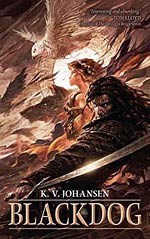
![]() TraciLoudin
TraciLoudin
2/7/2014
![]()
A secondary world fantasy, with gods and demons. The story is told from several POV characters, most usually from the Blackdog's point of view, as well as sometimes from a priestess's point of view, and then the goddess Attalissa's POV at the end.
We meet several gods throughout the book, who are technically "earth gods" (because the Great Gods are gone and away, and presumably the ones who are actually all-powerful). At the end of most of the early chapters is always an italicized paragraph, which I eventually realized were various storytellers talking about seven wizards and the seven devils who possessed them. (Usually you see those sorts of things at the beginning of chapters, so it took me a while to figure out what it was or who was telling those parts.)
The story is unique, the worldbuilding and political structures are interesting and fresh, and the man who becomes Blackdog is a good character to follow. I also enjoyed the way gender was treated in this novel, with certain gods preferring certain genders for their priest/esses, and how women were warriors as often as men were.
Unfortunately, I never got fully immersed in this book, and it's rather long (547 pages, and it's one of the big 9x6 paperbacks). Part of this was because most chapters seemed to start off slowly, with long unnecessary passages, before coming to the point.
Another reason was that at the beginning, POV shifted back and forth chapter-by-chapter, which was interesting, but then as soon as I started getting interested in one character, the POV shifted to another and stayed with him for a long, long time. (When they're under siege it goes from Otokas, the original Blackdog, to his niece, and so on, fairly quickly. Then when Otokas dies, it goes to the new Blackdog and stays with him for dozens of chapters.)
Then midway through the book, POV shifts to another character entirely, and since her name is similar to the goddess's name, it took me several paragraphs to even realize who she was. I found these chapters to be extremely dull until she went into the mountains to encounter the god Narva. At that point, the story was redeemed, and I really enjoyed it.
But just as I was starting to enjoy this character's story, the POV shifted again. I guess the problem is that I'm used to POV shifts being more chapter-by-chapter, where I get to know the characters gradually but at the same time, rather than in big chunks, where it feels like I'm being flung back and forth through the story.
Another problem was the narrative was sometimes surprisingly unclear. At the beginning, the story says a the Blackdog, Otokas, takes a lethal blow. So I assumed he was dead. I was confused when the story went on, from his POV! This same problem with describing death happened again later (with Bikkim). At another point, the goddess wants to return to her mountain for no apparent reason, making her character seem dull-witted. It's not until much later the story tells you it was a spell, pulling her in to her doom.
This lack of clarity in the narrative even prevented me from enjoying the climax, because I couldn't figure out whether the antagonist was alive or dead. And once I realized he was defeated, it was very anticlimactic. I still can't pinpoint when he died or whether Attalissa or Moth was the one to strike the final deathblow. I'm sure if I reread it... but I shouldn't have to reread a passage to figure out what happened.
So overall, I think the author told a great tale, which I enjoyed at several points, despite not being immersed most of the time. I wish more books had this kind of treatment of gender. The author created a unique world, interesting characters, and a satisfying storyline. The fault, in my opinion, lies with the editor.
Normally when readers complain about editing, they're annoyed with poor copyediting or proofreading, with typos, scattered punctuation, and so on. In this case, it was the developmental (content) editing that was the problem. Major swaths of chapters could have been slimmed down to give them more narrative weight, but they were diluted by the sheer redundancy of words. Various climactic moments would've had greater impact if the narrative had been clearer and more polished. Overall, the story was there, but dulled behind poor editing.